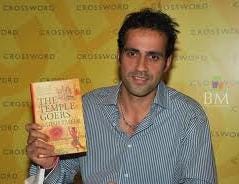Aatish Taseer on Arundhati Roy and his father, Salman Taseer
Aatish Taseer’s extremely interesting “Self Interview” brings out a few things that are profound and well said.
That he wasn’t on great terms with his father Salman Taseer, the Pakistani politician who died speaking against Blasphemy laws, is well known. For all those who don’t know, he is the son of Salman Taseer and Tavleen Singh – the Indian Journalist. He was born in England. Has recently written a book “The Temple Goers”. Aatish was born to Taseer and Tavleen when they were unmarried. He grew up in New Delhi and went to school in Kodaikanal. He later went to Amherst College for his graduation.
Can someone, whom you have not totally felt comfortable about, be pardoned in death? That is a dilemma that Aatish is really grappling with in this question:
Ida: Your father has been a significant presence in two of your books—I would even say three: The Temple-goers reeked of male issues. Has it been hard in real life to let him go?
Aatish: Yes. Because when someone dies, Ida, they win. The people who are left behind must surrender all the petty angers and resentments that they associated with that person when they were alive. And that process of giving up one’s existing impression of someone, of allowing them to pass into another realm, can be wrenching. You feel like your fist is being forcibly unclenched.
And, in the case of my father, there was the confusion I felt at his great courage in the end. I found myself very proud of this man who I had not spoken to in over three years. That was hard; having to change one’s mind about someone; of having to accept that–for all his flaws; and there were many–he was quite a big man. But Death can do that. It’s Like that line in Macbeth: “Nothing in his life became him like the leaving it.”
Salman’s courage of doing things right in the end seems to have endeared him to his son. For most part, Aatish has written elsewhere, that his father was rabidly anti-Indian (Why my father hated India).
Later in the interview, he goes on to talk about Arundhati Roy and puts her in place. One thing that he brings out very well is her antagonism to the “Middle Class” in India. The very group in India, which has supported her antics. It is the neo-educated and self confident (though inadequately aware) middle class that is behind her. Not the poor junta!
Ida: Sorry! So, we’ve talked about Noon, we’ve talked about Pakistan and your father, what about India? You’ve said some pretty harsh things about a certain writer cum activists on the Left–no names!–who, we in the States, kind of like. She seems, in an environment of rapacious capitalism, to be a friend of the poor and marginalised. What possible objection could you have to her?
None except that I don’t think she’s a friend of the poor at all. She would like to doom them to a permanent state of picturesque poverty. They are beautiful to her–the poor–beautiful, benign and faceless. And that is exactly how she wants them to stay. Let me say also that it is not the poor who animate her politics. Oh, no! The people who get her into the streets are the new middle classes. This class, still among the most fragile in India, people who have newly emerged from the most dire conditions, are despicable to her. She mocks their clothes; their trouble with English; she hates their ambitions; when India wins the cricket and she sees them celebrating, her skin crawls; she wants, more than anything, to do these people down. And it is her overwhelming hatred of them that allows her to be a friend of movements that are seemingly far apart. The jihadists, the Maoists, the Kashmir movement, the anti-development people…they’re all her friends. Anyone who can prove a credible threat to the future of India is a friend of that woman. I would go so far as to say she has a prurient fascination with the enemies of India. And where do they love her? In Pakistan, and in the faculty rooms of Europe and America. No surprise there.
Also, this business of pretending she’s a lone voice in the wilderness. What rubbish! At least have the good grace to admit that not one thing she says is provocative or new; it is perfectly banal. And we know how well the universities Europe and America reward this bogus cant!
I think we need a few more folks to bring out the banality of the so-called champions of the “weak” and “poor” who go about the work to demolish their very futures!




